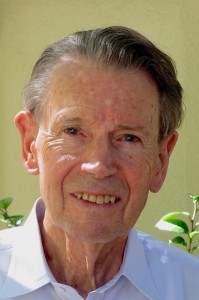Where Music, Literature and Computers Collide
When you retire, perhaps you’re considering taking up golf or planting roses. But when William McGee retired from IBM, he decided to pursue a life-long dream of studying music and, at 65, enrolled in SJSU’s baccalaureate program in music composition. He explored keyboards synthesizers, music theory and the use of technology in digital production. Previously, his last forays down the halls of academia had been in 1949 and 1951, when he earned degrees in physics respectively at UC Berkeley and Columbia, which led to his career as a computer scientist at IBM.
Happily, all these talents merged, and today from his home in Los Altos he uses them in his latest passion: understanding what about music attracts people. His knowledge of mathematics and computer programming has enabled McGee to use probability theory to quantify what musical components are present in popular songs.
McGee’s experience at San José State also prompted him to take other actions. After struggling with the outdated equipment in the studio, he created the McGee Music Recording Studio Fund in the School of Music and Dance. These gifts have long-range impact for future students, according to Pablo Furman, professor and coordinator of composition and music technology. “Now, countless students will enjoy taking classes in a new studio and learning critical skills necessary for successful work in digital sound production.”
McGee made other generous donations, including one to keep Reed Magazine, the campus literary journal founded in 1898, in print. “I’d like to see Reed Magazine continue; it’s had a very long history,” he said, noting that our campus lays proud claim to producing the oldest literary journal west of the Mississippi.
In addition, this alumnus created the Ruth MacLean McGee Scholarship Fund for the Department of English and Comparative Literature in the name of his late wife, Ruth, a writer. Mr. McGee’s rationale for this gift was based on his observations of patterns in higher education: “English departments are typically underfunded, and it seemed like a good way to support them.”
Today, our students in the College of Humanities and the Arts benefit from the old and the new, thanks to the generosity of one of our alumni—the latest cutting-edge technology used in music composition and the preservation of Reed Magazine.
by Cathleen Miller




